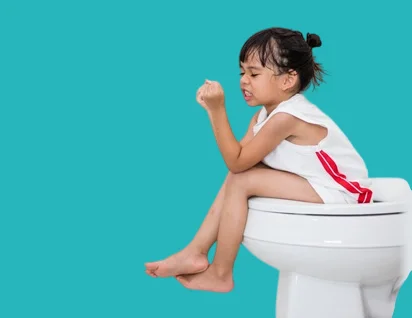Fecal incontinence in children is a problem that causes embarrassment for the child and raises concern for parents. It occurs when the child involuntarily passes stool at an age when they can control their bowel movements.
It can occur for physical or psychological reasons and can be treated with early diagnosis and adherence to treatment, which we will learn about in this article.
What is fecal incontinence in children
Fecal incontinence in children is the loss of control over defecation, leading to involuntary passage of feces on clothing or during play.
These symptoms are most often observed in children over the age of 4, at a stage when they are expected to be able to control their bowel movements.
Causes of fecal incontinence in children

The causes of fecal incontinence in children vary, but they may be psychological, behavioral, or a digestive disorder, including:
- Chronic constipation.
- Harsh toilet training.
- The child being exposed to stress or family problems.
- A disorder in the nerves or muscles responsible for the anal opening.
Symptoms of Fecal Incontinence in Children
The symptoms of fecal incontinence in children vary depending on the cause, but most commonly include:
- Loss of appetite.
- Abdominal pain and bloating.
- Chronic constipation.
- Fecal soiling of underwear.
- Psychological and behavioral disturbances resulting from shyness.
- Foul odor resulting from fecal leakage onto the skin.
How to Diagnose Fecal Incontinence in Children
Fecal incontinence in children is diagnosed by the doctor asking the parents about the child's bowel habits, the time of onset of the problem, and the psychological factors surrounding the child.
The doctor then examines the abdomen and rectum to check for accumulated feces or signs of chronic constipation. He may order some tests, such as ultrasound and X-rays.
If the doctor suspects a psychological cause, he may request a behavioral and psychological evaluation. The earlier and more accurate the diagnosis, the more accurately the doctor can develop a treatment plan.
Methods for Treating Fecal Incontinence in Children
Treatment for fecal incontinence in children depends on the underlying cause and includes:
- Constipation Treatment.
- Avoid punishing or ridiculing the child.
- Medication is recommended if the cause is organic.
- Regular toilet training is recommended.
How to prevent fecal incontinence in children

Fecal incontinence can be prevented by adopting the following healthy habits for children:
- Eat a high-fiber diet to avoid constipation.
- Reducing stress and fear in the child.
- See a doctor if you notice frequent constipation.
- Teach your child to use the toilet in a calm and encouraging manner.
- Teach them to use the toilet after meals to accustom the intestines to regular bowel movements.
Are there complications of fecal incontinence in children
Yes, if fecal incontinence is left untreated in children, some physical and psychological complications may occur, such as inflammation and irritation of the skin around the anus.
The accumulation of larger amounts of feces in the intestines makes treating constipation more difficult over time, leading to a loss of the sensation of needing to defecate. The child may also develop behavioral and psychological disorders such as anxiety, withdrawal, and low self-esteem.
Frequently Asked Questions about Fecal Incontinence in Children
Is fecal incontinence in children a psychological illness
No, fecal incontinence in children is not a psychological illness, but it may be associated with psychological factors such as stress, anxiety, and family pressures.
Who specializes in treating fecal incontinence in children
A pediatrician is the specialist, but the child may be referred to a gastroenterologist or psychiatrist.
Is fecal incontinence in children curable
Yes, fecal incontinence in children can be cured, especially with early diagnosis and appropriate treatment.
Is fecal incontinence in children dangerous
No, it is usually not dangerous, but it requires early diagnosis and careful treatment to avoid physical and psychological complications.
Article Summary
Fecal incontinence in children is the loss of bowel control due to chronic constipation or other psychological, behavioral, or organic factors.
Diagnosis is made by a pediatrician, and the earlier the diagnosis, the better to avoid the psychological and physical complications that the child may experience.
Providing your child with a healthy diet that contains plenty of fiber, such as vegetables and fruits, remains the best way to treat and prevent chronic constipation.